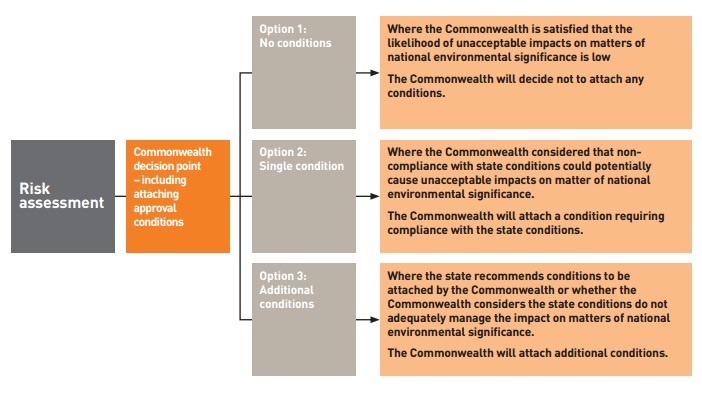As part of the Federal Government's One-Stop Shop framework for environmental approvals, the Assessment Bilateral Agreement Draft Conditions Policy (Policy) aimed at improving the efficiency of assessment bilateral agreements, has been placed on public exhibition. Once finalised, the Policy will initially apply to the New South Wales revised assessment bilateral agreement (NSW Bilateral Agreement) that came into effect on 26 February 2015. The Federal Government "will consider the extension of the policy to other states and territories following the public comment period". The Policy is on exhibition until 15 May 2015.
BACKGROUND
The Federal Government has approved a broad framework for achieving a One-Stop-Shop that will hand the final decisions on projects assessed under Australia's main national environmental laws to state and territory governments. The One-Stop Shop process comprises three stages:
- signing a Memorandum of Understanding with each state and territory;
- agreement on bilateral assessments and updating any existing agreement with the state/territory; and
- negotiation of approval bilateral agreements within 12 months with each state and territory.
The Policy will apply to assessment bilateral agreements entered into at stage 2 above.
Under the NSW Bilateral Agreement, the Federal Government has endorsed three Offsets Policies, being:
- NSW Biodiversity Offsets Policy for Major Projects, link here;
- Fisheries NSW Policy and Guidelines for Fish Habitat Conservation and Management, link here; and
- Rules established under section 127B of the Threatened Species Conservation Act 1995 (NSW).
(collectively, Endorsed Policies)
The effect of the Endorsed Policies is that, where a proponent is able to demonstrate that one of the Endorsed Policies has been applied, it will not need to separately and additionally demonstrate compliance with the Environment Protection and Biodiversity Conservation Act 1999 (Cth) (EPBC Act) Environmental Offsets Policy. In all other circumstances, the EPBC Act Environmental Offsets Policy continues to apply for the assessment of offset requirements.
THE DRAFT CONDITIONS POLICY
One of the overall objectives of the One-Stop Shop framework is to reduce duplication of conditions between state approvals and EPBC Act approvals. To assist with achieving this objective, the Policy sets out the Federal Government's proposed approach for setting conditions for projects that are assessed under the Assessment Bilateral Agreement.
The Policy will not apply to:
- an action in a Commonwealth area;
- the relevant part of an action that is partially located within a Commonwealth area;
- an action taken by the Commonwealth or a
- Commonwealth agency.
However, the Policy will apply to an action that is outside a Commonwealth area, but has, will have or is likely to have a significant impact on a Commonwealth area.
The Policy's approach to conditions setting is "risk based", which is intended to result in conditions of approval that are "tailored, fit-forpurpose and appropriate to the level of environmental impact likely to result from the approved project". A risk assessment, which is conducted after assessment and before approval, will be undertaken by the Commonwealth to assess a project's risk of causing serious or irreversible harm to matters of national environmental significance (MNES). Based on the risk assessment, the project will fall into one of three categories of the Policy's condition setting hierarchy whereby the Commonwealth decision maker will:
- attach no conditions: where the project is deemed to be low risk to MNES and the state or territory conditions provide adequate environmental protection; or
- attach a single condition to require compliance with particular state or territory conditions: where noncompliance with state or territory conditions could potentially cause unacceptable impacts on MNES; or
- attach additional conditions to protect MNES: in exceptional circumstances relating to MNES where the state or territory has requested Commonwealth conditions or where the Commonwealth decision maker deems it necessary to address the project's impacts on MNES.
The flowchart below summarises the risk assessment and condition hierarchy:
New South Wales will be required to demonstrate the effectiveness of its conditions through annual reporting to the Federal Government.
Importantly, while the Policy provides guidance on setting conditions, the Federal Government retains discretion under the EPBC Act to make decisions based on the circumstances of each project and may add or vary conditions of approval. The Policy states (at page 7) that this may occur in circumstances where:
... the significant impacts of an action were not previously identified (either in nature or scale) and the Commonwealth decision maker considers that a change to the conditions of approval is needed to protect matters of national environmental significance.

IMPLICATIONS
The Assessment Bilateral Agreement and the Policy are intended to further streamline the consideration of projects by the Federal Environment Minister and benefit business by shortening the assessment period and reducing duplication in conditions.
Proponents of a project that is currently being assessed under the NSW Bilateral Agreement will not need to take any additional action as the project will transition automatically to being assessed under the Assessment Bilateral Agreement. The Policy can be accessed here.
Submissions on the Policy may be made until 15 May 2015 in the following way:
- 1 Submissions should provide the reference: 'Assessment bilateral agreement – Draft Conditions Policy'.
- 2 Send your submission by email or post:
-
- Email: OneStopShop@environment.gov.au (the preferred option)
- Post: Regulatory Reform Taskforce Department of the Environment GPO Box 787 CANBERRA ACT 2601
The content of this article is intended to provide a general guide to the subject matter. Specialist advice should be sought about your specific circumstances.
 |
|
| Most awarded firm and Australian deal of
the year Australasian Legal Business Awards |
Employer of Choice for
Women Equal Opportunity for Women in the Workplace (EOWA) |

